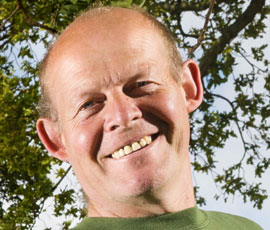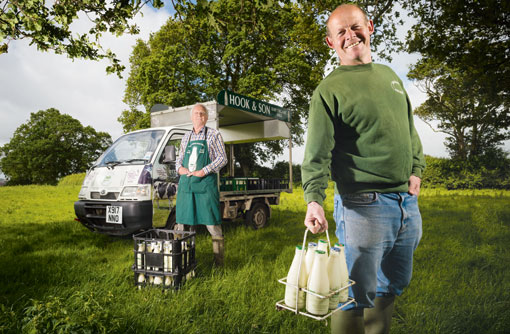Sussex dairy farmer set for big screen debut

Film stars are notorious for running late. But how many delay the screening of their film debut so they can finish the milking?
Farmer Steve Hook looked an unlikely matinée idol when, recently, he slipped nervously into an unmarked seat in the red velvet stalls of his local cinema – a short Land Rover ride from Longleys Farm parlour where he’d been taking the clusters off just a few minutes earlier.
Balding, middle-aged and softly spoken, he’s hard to mistake for a big screen hero. But with The Moo Man showing at Robert Redford’s Sundance Film Festival, which opened on 17 January in Utah, Steve and his leading lady Ida – a shapely Holstein Friesian – look set to become the dairy industry’s hottest celebrity pair.
“I didn’t choose Ida, she chose me,” Steve says in that self-effacing Hollywood way that actors have of talking about their co-stars.
Except in Steve’s case, it’s true. Of the cast of 75 black-and-whites at the heart of this 90-minute rural drama, none has the same kind of electricity with the leading man as Ida. Their connection off-screen was as intense as it was on, he admits, and ultimately that’s what he hopes will sell this movie.
Beautiful animals
“Cows are beautiful animals. When people realise they have characters and that farmers really do care about them, it can only help the industry,” he says.
This is clearly a movie with a message, but wrapped up in breathtaking camerawork and subtly underscored by Stephen Daltry’s sometimes funny, sometimes poignant soundtrack.
“If dairy farming came across badly that would be extremely damaging, but if people really connect with a dairy farmer’s life and the cows, I think that’s helpful on all sorts of fronts, whether it’s with the milk price or culling badgers,” says Steve.
For two-and-a-half years, Longleys Farm on the Pevensey Levels in East Sussex was producer Andy Heathcote’s studio and Steve, his family and 18 staff, all employed in keeping the then newly launched raw organic milk round on the road, became used to him scrutinising their every move.

He was there to capture the whole family, playing like excited kids with their new bottling machine; he was hunched in a corner of a birthing stall when the ropes went on for a difficult late-night calving; he was the unseen guest at an unintentionally hilarious Sunday breakfast with Steve’s dad Phil; and even eavesdropped on one of those typical domestic conversations a man insists on holding with his wife through a closed bathroom door.
“I was stuck in the bath for ages as I knew Andy was on the other side with Steve and I couldn’t come out,” recalls Steve’s wife, Claire.
For her, there is just one moment in this candid fly-on-the-wall documentary that cuts a little too close to the bone – when her husband talks movingly about giving dairy farmers such as themselves, forced on to working family tax credits, a milk price that lets them keep their dignity.
One of the Hooks’ four sons, 16-year-old William, says: “When I told my friends, they thought it was quite weird making a film out of it, but I think it’s important people watch,” he says. “There’s a story that’s not been told about farming and it sends a message to Mr Tesco that the price we get for the milk is out of order.”
Steve’s father Phil agrees. “The film is as it happens. There’s nothing forced, it’s warts and all and that’s how the public should see us,” he says.
Phil and Steve are no strangers to the limelight, having been involved in a successful, long-running campaign to save their local mart.
They’re of like-mind when it comes to standing up – and speaking out – for what they believe in. So when Andy and his partner, fellow filmmaker Heike Bachelier, who were already customers of the Hooks, asked if they could make a film about the farm in 2008, they didn’t hesitate to say yes.
“It was not a film that we commissioned, so Andy had total control and we were in the lap of the gods, really,” says Steve. “There was quite a bit of trust involved, but we knew he was not trying to do an exposé. The idea was that he would film and whatever happened, happened. He wanted to capture it as it went.
“It never got to me, having a camera around all the time. Andy was never in my face or bossing me about. But on the other hand he could never help me if I had a calf get out or something like that. He just carried on filming,” says Steve. “Now it’s over, I miss having him around.”
The two ended up talking by phone every other day about events on the farm – Andy was even invited to observe a tense meeting with the bank manager. In another telling scene, he caught an emotional Steve buckling under the strain of punishing 70-hour weeks as herdsman, milkman, marketing guru and MD.
It didn’t make the final edit, but not because Steve wasn’t prepared for people to see the pressures dairy farmers are under – there was just too much film.
When Heike finally sat down to edit the movie in 2010, she faced a daunting 130 hours of celluloid, which partly explains the delay in bringing it to the big screen.
“I had a lot of long interviews in the kitchen with Steve that aren’t in there either,” says Andy. “They were a bit like therapy sessions. There was lots of stuff I was sorry to lose.”
But the sacrifice was worth it because what Heike quickly realised was that the story of one family’s Herculean struggle to continue farming, and all the complex reasons why consumers should care that they succeeded, was best left to the cows to tell – which they do with grace, gentleness and great dollops of humour.
Endearing movie
What emerges is an endearing little movie that tackles some surprisingly big issues – about our relationship with animals and the consequences of a supermarket-driven economy – and it’s good enough to have impressed the selection panel for one of the most hotly contested film festivals in the world.
Steve, whose comedy subplot with dad Phil is worthy of a series, still manages to get in his two pennies’ worth on film.
He’s not a fan of dairies going down the “big numbers route” and his views on processors who have “screwed the industry” are well known.
“I say things in the film about pasteurised milk and dairy bull calves being shot, but I’m not worried how other dairy farmers react to it,” he says.
“I firmly believe that they produce a fantastic product and the quality is not recognised further down the chain. That makes me cross. I’m certainly not worried what the processor industry thinks, but I do worry about the public because it’s their perception of farming that’s the most critical of the three groups.”
If fortunes change in the dairy industry, could he be tempted to film a sequel?
“If the film does take off, Andy has enough material to do something else. That’s his call,” says Steve.
Meanwhile, he’s been pondering who to take on his arm for the walk up the red carpet in Utah at the Sundance Film Festival. Move over Claire, Steve’s got 75 star-struck wannabes to choose from…
Read more about the project at www.the-mooman.co.uk
